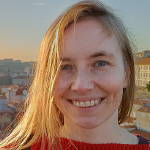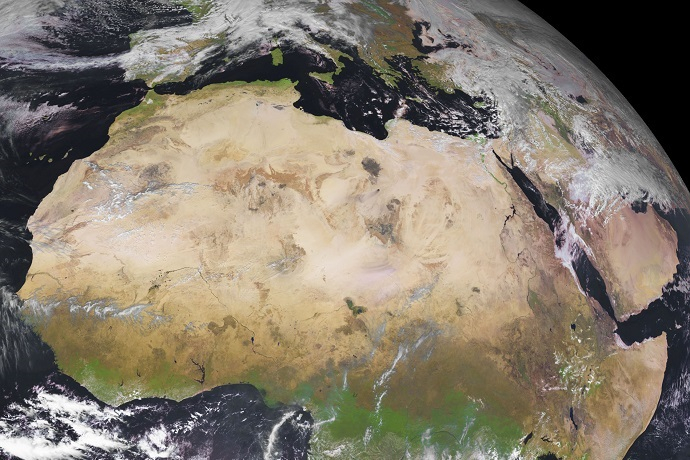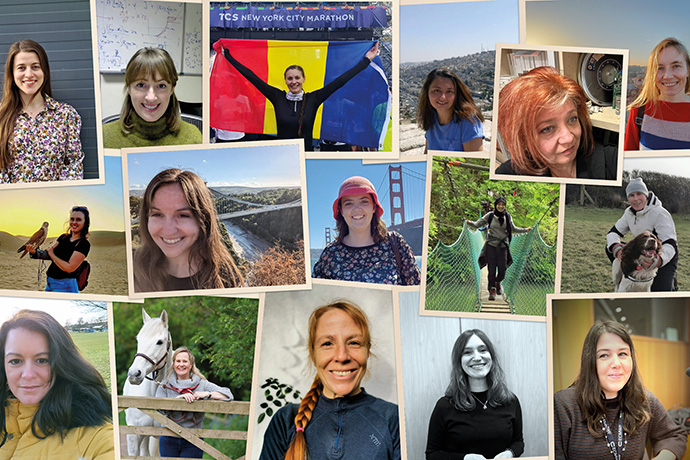
Birgit Sützl, Earth System Modelling Section, ECMWF Research Department
To mark International Women’s Day, Birgit Sützl, an early career research scientist at ECMWF, shares her experiences of studying maths at university and her journey to find her perfect career path in Earth system modelling.
I had the opportunity to study maths and science at university, however, I found that the career paths commonly offered to students didn’t fit my particular interests and ambitions. There were different options out there, I just had to actively seek them out.
Today I’ve found my niche using my mathematical skills to contribute to real-world issues in Earth sciences.

The perfect career for me: using my maths skills to understand weather and climate, and their wider impacts. Image: EUMETSAT 2019
Stereotypes and a lack of female role models
When I finished school in 2009, I chose to study maths at university. My choice was motivated by my curiosity towards understanding the underlying mechanisms that drive a system, investigating structures and patterns. I liked analysing and logical thinking. I wanted my career to focus on solving real-world problems and I saw my talent for maths as a tool to achieve that.
In hindsight I know that studying engineering or science would have been a more straightforward choice to work on applied topics, but back then I was put off by the stereotypes of engineering and science and I could not imagine myself in such an environment. At that point in time, I hadn’t encountered any woman in science that I could identify with (either in my day-to-day life or a public figure).
In my view, maths had a slightly more balanced image than other STEM subjects (science, technology, engineering and maths), but I was also often confronted with the stereotype that girls are not good in maths.
The ratio between female and male students in our course was far from equal and being one of the few women in our class, I sometimes felt that it was up to me to prove the stereotype wrong. This put me under pressure not only to succeed in my degree but to be better than average. At the same time, I was fighting with expectations and biases in our work environment (such as the language used in our textbooks which portrays mathematicians automatically as male, and colleagues that would not recognise that this matters).
There were even fewer women further up in academia, and I didn’t have a single female lecturer during my undergraduate degree. All in all, it didn’t give me great confidence and I felt that I would never fit into the picture of a ‘typical’ mathematician.
Finding my direction – maths and the real world
During my undergraduate degree I did not yet know which way I wanted my career to go. The typical career advice for mathematicians not wanting to stay in academia would point towards the financial sector, automotive industry or consulting firms, which I knew was not what I was interested in. I was drawn towards challenges such as sustainability and health and I wanted to make a positive impact in those areas.
After finishing my Bachelor’s degree I took some time off to travel, visiting amazing places on Earth and becoming even more fascinated by the complex processes that govern weather in different ways around the world.
I made the first connection between maths and meteorology in my internship at the Austrian meteorological service, ZAMG (now GeoSphere Austria), where I was introduced to the many interesting challenges of numerical weather prediction (NWP) and Earth system modelling.
I was still looking for a role as a mathematician that I felt comfortable with, and I was lucky to find a Master’s degree programme that allowed me to explore applications of mathematics that were better aligned with my interests. I went to Heriot-Watt University in Edinburgh for a Master’s course which focused on mathematical modelling in biology, ecology, medicine, and climate change. I really enjoyed this course, especially my summer research project on modelling desertification processes, and experienced a very supportive environment from both the university and my colleagues. Performing well in the Master’s gave me the confidence to go on with PhD studies.
Onwards to a PhD in urban climate modelling
I joined a PhD programme called ‘Mathematics of Planet Earth’ at Imperial College London, which was focused on the maths behind Earth system sciences. It was an exciting interdisciplinary and international environment, and although maths was at the core of it, I started to grasp the breadth of applications, from air pollution to oceanography, climate variability to renewable energy. Every student had a different background, academic career path and different interests, which also meant that I felt less pressure from comparing myself to others.
The gender balance at my new university wasn’t great either, but I gained confidence from having brilliant fellow female PhD students, with whom I shared my thoughts and experiences of being a woman in this research area. We spoke about how we sometimes felt intimidated and overwhelmed, and how it was difficult to deal with failures and unrealistic expectations (some posed by ourselves). It felt good to have these open conversations and we could relate to each other’s experiences.
As a PhD topic I chose urban climate modelling, a very application-driven research field. My research focused on atmospheric transport processes over cities and the complex response of the atmosphere to heterogeneous urban environments. My project involved a collaboration with the UK Met Office, from which I got first-hand experience in atmospheric modelling for NWP. I could not have been happier with my choice. It is a fascinating subject with real-world impact – urban meteorology is closely connected to urban planning and questions of how we improve air quality, heat stress, and general quality of life in cities, a topic which I got more involved in later during my Postdoc. Also the urban climate research community is a very inclusive and welcoming one, and, really for the first time, I met some top-level female researchers and role models.
My PhD project was very interdisciplinary, but if I had to pick one label, today I would say that it was a PhD in atmospheric physics. But if you had asked my 18-year-old self if I'd like to study physics, I would have said ‘never in my life’. Sometimes the labels can deter from the content.
A fulfilling role at ECMWF
At ECMWF, I work on modelling cities, forests, and mountains within our Earth system model. Today, there are still fewer women than men in Earth system modelling, but the environment feels inclusive and there are fantastic female role models across all career stages: group leaders, the Destination Earth Science lead, and our female Director-General.

Some of the women working at ECMWF spoke about their work on the occasion of the International Day of Women and Girls in Science 2023.
My work is part of the EU’s Destination Earth initiative. Destination Earth aims to bring even higher resolution to global modelling, incorporate even larger amounts of real-world, real-time data, and strengthen the use of Earth system models for policy decisions and adaptation measures for our world under climate change.
My work is exciting, and it is satisfying to know that it has a real impact. I am grateful for the opportunities that allowed me to find my own path, and a career that aligns with my values and interests.
I encourage girls and women interested in science to have the courage to search for what it is they like to do, regardless of how they might be perceived by others. Don’t waste time comparing yourself to others; everyone is different, and you will find your own way!
About International Women’s Day
International Women's Day (March 8) is a global day celebrating the social, economic, cultural, and political achievements of women. The day also marks a call to action for accelerating women’s equality. The theme for 2023 is ‘Embrace equity’. Equity goes beyond giving everyone ‘equal opportunities’; it is about recognising different people’s needs to help drive success for all.
